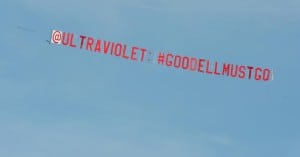
The NFL is under siege. Last week’s arrest of Arizona Cardinals running back Jonathan Dwyer on assault charges was just the latest in a series of alleged crimes by NFL players that have started to threaten the league’s credibility. Prior to Dwyer’s arrest, star running backs Ray Rice and Adrian Peterson were cut and suspended, respectively, by their teams for domestic violence and child abuse allegations. What is more, Carolina Panthers ’ Greg Hardy, who was found guilty in July by a district judge of assaulting and threatening to kill his ex-girlfriend, was put on the exempt-commissioner’s permission list (meaning a “voluntary” leave of absence) just hours after the Minnesota Vikings made a similar move with Peterson.
“The Vikings indefinitely deactivating Peterson based on media and pressure proves the point that the league seems more reactionary to polls and public opinion of the day than thoughtful and methodical measures,” said Juda Engelmayer, senior VP at 5W Public Relations. “It needs a real plan for these episodes and to make decisions based on set criteria and uniformity.”
The NFL 2014-2015 season is just three weeks old, but the scandals now swirling around the league have started to overshadow the feats on the field and sullied the game. Some major sponsors, including Anheuser-Busch, have started to question the integrity of the league, and now politicians are getting in on the act, not a good sign for a company that want to get out from under a crisis.
Indeed, NFL Commissioner Roger Goodell and his staff are facing a crisis of epic proportions. But the league has only itself to blame.
Starting with the Ray Rice domestic abuse case, the NFL dug itself a big hole when Goodell said that neither he nor his staff had seen a second video installment of Rice punching his then-fiancée in an Atlantic City elevator; an initial video segment showed Rice dragging his then-fiancée out of an elevator. (The league has hired former FBI Director Robert Mueller to investigate the handling of the Rice case.)
Now you have the Watergate-inspired question—What did he know and when did he know it?—dogging Goodell. “When you lead with your chin and make categorical statements you better make sure you’re right,” said Bill Nowling, a PR and crisis communications consultant who is currently managing the Detroit bankruptcy, referring to Goodell’s denial of having seen the second portion of the video.
He added: “This is where senior PR managers need to have a great relationship with C-level executives and corporate counsel because a lot of times information may come in that I’m not initially aware of, but because I’m talking with counsel on a regular basis I can find out stuff.”
The crisis is still evolving and new revelations may surface that further damage the league’s reputation.
However things shake out, this year will be remembered as the time that the NFL got knocked off its pedestal and started to change its culture.
For senior PR managers, the NFL scandals (and the league’s bumbling responses) hold several lessons. Perhaps the biggest takeaway is the needs to set new standards without concern “for the gate” and strongly communicate those standards to the public, Dowling said
“You’re a professional organization with certain standards that all employees—players, coaches and front-office personnel—need to adhere to,” he said. “That’s part of corporate America, where rules and regulations are made, and if there’s a breach of the rules there will be repercussions for behavior detrimental to the organization. It’s time for the NFL to get with the program.”
Another PR lesson stemming from the NFL crisis is how communicators need to take pains to distinguish between the legal court and the court of public opinion (not to mention whether your company is cognizant of major changes in societal mores).
“It’s not only working to improve the league’s performance and holding players accountable, but using these episodes as a way to educate the public about domestic abuse and child abuse,” said Howard Opinsky, executive VP of Hill+Knowlton Strategies and general manager of the agency’s Washington, D.C. office. “The league can draw attention, in a positive way, for dealing with these very difficult issues, and that’s not business as usual.”
He added that the NFL rehabilitating its image will have less to do with “what it’s saying than what it’s doing.”
On Friday afternoon Goodell held a press conference, where he was expected to face some withering questions.
Sidebar: 3 PR Tips for When the Boss’s Job Is in Jeopardy

The Ray Rice scandal underscores multiple ways in which crisis management has evolved. Standards of transparency and accountability are appreciably higher. Social media accelerates the pace at which developments unfold and undermine an organization’s ability to control the narrative. Even the most loyal audiences are skeptical from the outset, viewing the key players as guilty until proven innocent. Every past decision falls under the microscope as the media probe for patterns of bad behavior. A generation of brand building is undone in an instantaneous viral video.
And that’s just the first 48 hours. It’s a daunting landscape for any communications professional charged with saving the brand and the boss’s job, but there are proven strategies that level the playing field.
1. Understand the Age of Transparency. We are all now on Candid Camera. Depending on where you live, Americans are caught on camera up to 300 times a day. The wall between credible (e.g., legacy) and incredible (e.g., social) media is gone. Now that TMZ will routinely pay for video and audio, everyone will. No longer is paying a source or using only a single source verboten. If it’s salacious, it’s news. Don’t “tsk, tsk” the NFL too loudly. You could easily be next. If an employee engaged in the act, there is a good chance someone has proof. Don’t deny the truth or be afraid of the facts. Remember Richard Nixon’s legacy: “It’s not the crime, it’s the cover-up.”
2. Be credible. The initial statement needs to adhere to the watchwords of concern, responsibility and action. At the same time, it can’t ignore reality. Craft messages that will stand up under cross-examination and still make sense when follow-up questions are asked. Where mistakes have been made, admit them and emphasize how they will inform decision-making moving forward. Say what you know, but only what you know for sure. You never want to reverse field as later facts are known.
3. Don’t go it alone. Independent, third party voices are needed to validate the CEO’s position. They can be associates with standing in the particularly affected community (such as the NFL’s many female executives who were engaged so incredibly late in the game). They can be academics, above-reproach investigators you’ve engaged, or anyone with standing. The important thing to remember is that truth is a popularity sport. The more credible voices in the wilderness, the more people follow.
This sidebar was written by Richard Levick, chairman-CEO of LEVICK.
CONTACT:
Juda Engelmayer, [email protected]; Bill Nowling, [email protected].
This article originally appeared in the September 22, 2014 issue of PR News. Read more subscriber-only content by becoming a PR News subscriber today.
